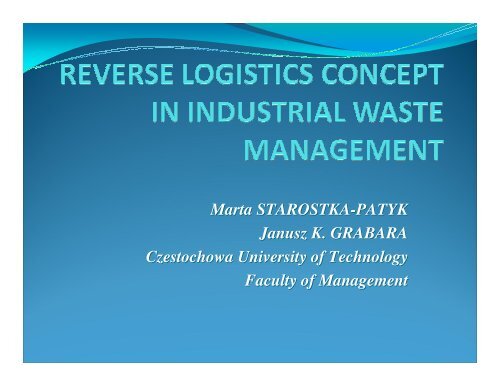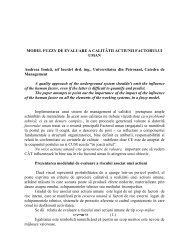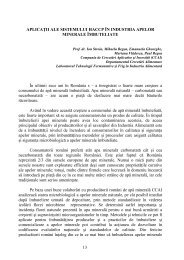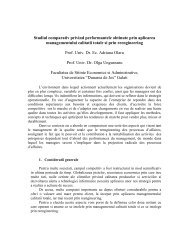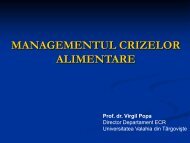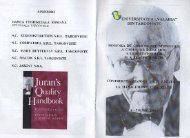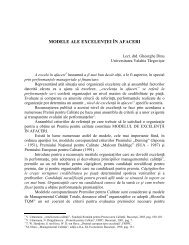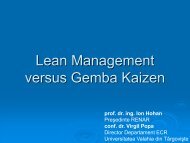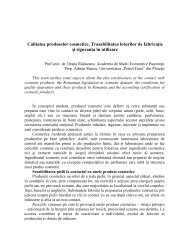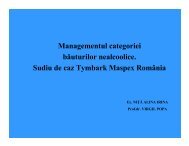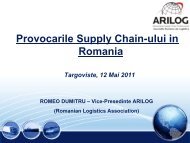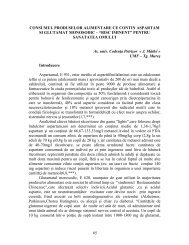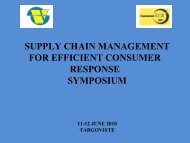waste management - ecr-uvt
waste management - ecr-uvt
waste management - ecr-uvt
Create successful ePaper yourself
Turn your PDF publications into a flip-book with our unique Google optimized e-Paper software.
WASTE DEFINITIONS products of living or dead nature, which is not used at anygiven stage of human development or because of theirconviction of the uselessness, or lack of appropriatemethods and technologies for their utilization. Substancesencountered a substrate or product of the process andonly the degree of willingness and human consciousnessdepends on whether they are classified into usefulsubstances or <strong>waste</strong>
WASTE DEFINITIONS substances or objects which the holder discards or intendsto carry out the removal or disposal is required undernational law all items, and solids, and non-sewage liquid substancesresulting from business activities or human existence andunsuitable place and time in which they arise, as <strong>waste</strong> isalso considered sludge
WASTE MANAGEMENT Waste <strong>management</strong> is:the collection, transport, processing, recyclingor disposal, and monitoring of <strong>waste</strong> materials. The term usually relates to materials producedby human activity, and is generally undertaken to reduce theireffect on:health, the environment or aesthetics. Waste <strong>management</strong> is also carried out to recover resources fromit. Waste <strong>management</strong> can involvesolid, liquid, gaseous or radioactive substances, with differentmethods and fields of expertise or each.
REVERSE LOGISTICS By Council of Logistics Management :the term often used in relation to the roleof logistics in recycling, <strong>waste</strong> managing and <strong>management</strong>of hazardous materials, in a broader sense applies to all issues relatedto logistic activities undertaken in order to reduce the useof raw materials, recycling, substitution, reuse ofmaterials and <strong>management</strong> the way to maximize the value of <strong>waste</strong>
REVERSE LOGISTICSUSAGEIN INDUSTRIAL WASTEMANAGEMENTConsists of four main processes: <strong>waste</strong> collection, <strong>waste</strong> storage, <strong>waste</strong> <strong>management</strong>, <strong>waste</strong> transport.
WASTE COLLECTION Involves collection, segregation, and the development ofrelevant documentation relating to industrial <strong>waste</strong>; Important are the regulations on proper identification anddocumenting the flow of industrial <strong>waste</strong>collected. Documents are based on <strong>waste</strong> registration cardscontaining: data on the types and weight of <strong>waste</strong> generated ata given time, the mass of <strong>waste</strong>, data on recipients of <strong>waste</strong>,the date and location of <strong>waste</strong> reception, weight of the <strong>waste</strong>in a landfill and during their storage, etc.
WASTE STORAGE taking into account the economic lot size for transport,since those costs are less significant due to the low valueof industrial <strong>waste</strong>; is focused on providing sufficient space for <strong>waste</strong> and theappropriate treatment of them in due time to the mostefficient possible use or disposal; used to concentrate <strong>waste</strong> from various sources, allocatethem according to their land use decisions, facilitate theformation of transport chains
WASTE MANAGEMENT the process of having a close connection with the types of<strong>waste</strong> held; decide the ultimate point to which <strong>waste</strong> would be send: toplant provides equipment suitable for recycling industrial<strong>waste</strong>, or given type of <strong>waste</strong> transfer to landfill fordisposal; hazardous <strong>waste</strong>s must first be processedto remove their hazardous properties
WASTE TRANSPORT is the heterogeneity of transport facilities, high risk ofenvironmental pollution in caseof failure and eliminating empty carriage; high degree of complexity of transport services for theindustrial <strong>waste</strong>, which hasa significant impact on transport costs; requires appropriate marking of vehicles, training driversin the safe transport of <strong>waste</strong> and methods of action incase of accident
CONCLUSIONSDirect benefits to the organization: reducing consumption of raw materials for production, adding value to the process of recovery, disposal cost savings.Indirect benefits expected:• marketing issues, strategic and competitiveBy realization of reverse logistics processes in industrial<strong>waste</strong> <strong>management</strong>, it is organized in better way, and allowsfor receiving materials, which are going back again to theforward logistics processes as an input, for cost savings, fornatural environmental protection and for better competitiveposition.


